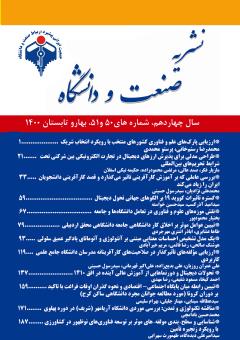تبیین عوامل مؤثر بر اخلاق کار دانشگاهی جامعه دانشگاهی محقق اردبیلی
محورهای موضوعی : عمومی
اباذر اشتری مهرجردی
1
,
طاها عشایری
2
![]()
1 - استادیار موسسه مطالعات اجتماعی و فرهنگی وزارت علوم، تحقیقات و فناوری؛ تهران، ایران
2 - استاديار، گروه تاریخ و جامعهشناسی دانشکده علوم اجتماعی دانشگاه محقق اردبیلی، اردبیل، ایران
کلید واژه: اخلاق کار, جامعه دانشگاهی, رضایت شغلی, استرس شغلی, هویت و تعهد سازمانی,
چکیده مقاله :
هدف اصلی پژوهش مطالعه عوامل موثر بر اخلاق کار دانشگاهی در جامعه دانشگاهی محقق اردبیلی (1400-1401) است. روش تحقیق از نوع پیمایش (کمی)، پرسشنامه، جامعه آماری آن 6000 نفر که 384 نفر بهصورت کوکران و به روش خوشهای تصادفی در بین آنها توزیعشده است. روایی و پایایی پژوهش نیز تأییدشده است. نتایج نشان میدهد که میزان اخلاق کار برحسب وضع تأهل تفاوت معنیداری داشته و مقدار آن در میان گروه متأهل (1.8) بیش از سایرین سطح اخلاق کار برحسب سطح تحصیلات تفاوت میپذیرد و مقدار آن در میان گروه دارای سطح تحصیلات دکتری (2.1) نسبت به سایر گروهای تحصیلی بیشتر است. سطح اخلاق کار برحسب نوع شغل تفاوت میپذیرد و مقدار آن در میان گروه شغلی هیئتعلمی (2.6) و دانشجویان (2.2) نسبت به سایر گروهای شغلی بیشتر است. سطح اخلاق کار برحسب نوع طبقه تفاوت میپذیرد و مقدار آن در میان طبقه بالا (3.1) بیشتر از طبقه متوسط و پایین است. نتایج نشان میدهد که بین رضایت شغلی (0.35)؛ استرس شغلی (0.31-)؛ فرسودگی شغلی (0.34-)؛ تعهد سازمانی (0.56)؛ هویت سازمانی (0.30) و باورهای مذهبی (0.28) رابطه معنادار با اخلاق کار وجود دارد. نتایج رگرسیون نشان میدهد که ضریب همبستگی چندگانه برابر با 0.601؛ ضریب تبیین برابر با 0.532 و ضریب تبیین تصحیحشده برابر با 0.483 است
The main purpose of the reseaThe main purpose of the research is to study the factors affecting academic work ethics in the academic community of Mohaghegh Ardabili (1401- 1400). The research method is survey type (quantitative), questionnaire, its statistical population is 6000 people, of which 384 people are distributed among them in a Cochrane and random cluster method. Validity and reliability of the research has also been confirmed. The results show that there is a significant difference in the level of work ethic according to the marital status, and its value among the married group (1,8) differs more than the others according to the level of education, and its value among the group with a doctorate level of education (2,1) compared to others. There are more academic groups. The level of work ethic varies according to the type of job, and its value is higher among the occupational group of teachers (2,6) and students (2,2) than other occupational groups. The level of work ethic varies according to the type of class and its value is higher among the upper class (3,1) than the middle and lower class. The results show that between job satisfaction (0,35); Job stress (-0,31); Job burnout (-0,34); organizational commitment (0,56); Organizational identity (0,30) and religious beliefs (0,28) have a significant relationship with work ethics. The regression results show that the multiple correlation coefficient equals 0,601; The explanatory coefficient is equal to 0.532 and the corrected explanatory coefficient is equal to 0,483.rch is to study the factors affecting academic work ethics in the academic community of Mohaghegh Ardabili (1400-1401). The research method is survey type (quantitative), questionnaire, its statistical population is 6000 people, of which 384 people are distributed among them in a Cochrane and random cluster method. Validity and reliability of the research has also been confirmed. The results show that there is a significant difference in the level of work ethic according to the marital status, and its value among the married group (1.8) differs more than the others according to the level of education, and its value among the group with a doctorate level of education (2.1) compared to others. There are more academic groups. The level of work ethic varies according to the type of job, and its value is higher among the occupational group of teachers (2.6) and students (2.2) than other occupational groups. The level of work ethic varies according to the type of class and its value is higher among the upper class (3.1) than the middle and lower class. The results show that between job satisfaction (0.35); Job stress (-0.31); Job burnout (-0.34); organizational commitment (0.56); Organizational identity (0.30) and religious beliefs (0.28) have a significant relationship with work ethics. The regression results show that the multiple correlation coefficient equals 0.601; The explanatory coefficient is equal to 0.532 and the corrected explanatory coefficient is equal to 0.483.
